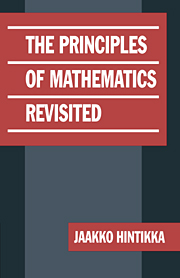Book contents
- Frontmatter
- Contents
- Introduction
- 1 The functions of logic and the problem of truth definition
- 2 The game of logic
- 3 Frege's fallacy foiled: Independence-friendly logic
- 4 The joys of independence: Some uses of IF logic
- 5 The complexities of completeness
- 6 Who's afraid of Alfred Tarski? Truth definitions for IF first-order languages
- 7 The liar belied: Negation in IF logic
- 8 Axiomatic set theory: Fraenkelstein's monster?
- 9 IF logic as a framework for mathematical theorizing
- 10 Constructivism reconstructed
- 11 The epistemology of mathematical objects
- Appendix (by Gabriel Sandu)
- References
- Index of names
- Index of subjects and titles
11 - The epistemology of mathematical objects
Published online by Cambridge University Press: 15 December 2009
- Frontmatter
- Contents
- Introduction
- 1 The functions of logic and the problem of truth definition
- 2 The game of logic
- 3 Frege's fallacy foiled: Independence-friendly logic
- 4 The joys of independence: Some uses of IF logic
- 5 The complexities of completeness
- 6 Who's afraid of Alfred Tarski? Truth definitions for IF first-order languages
- 7 The liar belied: Negation in IF logic
- 8 Axiomatic set theory: Fraenkelstein's monster?
- 9 IF logic as a framework for mathematical theorizing
- 10 Constructivism reconstructed
- 11 The epistemology of mathematical objects
- Appendix (by Gabriel Sandu)
- References
- Index of names
- Index of subjects and titles
Summary
At this point, it behooves me to reflect on what I am doing and to generalize the questions that I have raised. It was indicated above that the constructivistic interpretation of logic and mathematics outlined in the preceding chapter is not without precedents. The philosophical motivation of the constructivistic interpretation discussed there is new, or at least much more fully articulated than the expressed earlier motivations of similar views. But the technical implementation of my interpretation does not stray very far from Gödel's Dialectica interpretation (1958) of first-order elementary arithmetic or from Kleene's readability interpretation (see Kleene 1952, sec. 82).
However, it is possible to generalize the entire constructivistic interpretation considered here in a way which is more radically new and which opens the door to a deeper motivation of constructivism. This motivation can be seen by criticizing the way I have tried experimentally to present a raison d'être for the one particular version of constructivism in the preceding chapter. This rationale turned on the alleged impossibility of playing a semantical game in accordance with a nonrecursive strategy. It was found unconvincing. A working mathematician might very well resent the tacit limitations that my tentative argument imposes on a mathematician's ability to play a semantical game. Surely a competent mathematician is not restricted in his or her mastery of strategies to such simple ones as to be codifiable by recursive functions – that is, to functions that even a stupid machine can handle.
- Type
- Chapter
- Information
- The Principles of Mathematics Revisited , pp. 235 - 253Publisher: Cambridge University PressPrint publication year: 1996



